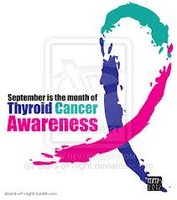
| (BPT) – When Sue Hollingsworth was diagnosed with advanced medullary thyroid cancer (aMTC), she had never even heard of the disease, let alone met another patient like her. Feeling isolated and unable to find information to best prepare herself for what the future held, she began writing letters for her daughter to read after her passing. “My daughter was 9, and I didn’t know if I would be around when she turned 16, when she went to her first prom. These were things that bothered me,” says Hollingsworth. |
| Facing a diagnosis of thyroid cancer can be terrifying for anyone. And that fear can be compounded with a rare form of thyroid cancer such as medullary thyroid cancer. Of the more than 60,000 cases of thyroid cancer expected to be diagnosed in 2014, only about 4 percent will be MTC. Even more uncommon is MTC that is advanced, which means that it has spread beyond the thyroid gland. While there is no cure for aMTC, treatments are available to help patients. Still, many patients living with aMTC can feel isolated and neglected by a lack of information geared toward their unique issues. They continue to face friends and family who don’t understand why their disease is different than more common forms of thyroid cancer, and few programs are available for awareness and support. “Many people don’t understand that advanced MTC is a very different diagnosis than other types of thyroid cancer. A number of cancers are still considered rare diseases, and living – and caring for those living – with these rare diseases can be exceptionally difficult,” says Gary Bloom, executive director of ThyCa: Thyroid Cancer Survivors’ Association, Inc. ThyCa and other key organizations are working to raise awareness of aMTC and provide resources for those affected by the disease, reminding patients and caregivers that support is available. For Hollingsworth, her journey is a difficult one but now filled with encouragement from her loved ones and personal strength for the road ahead. “Since being diagnosed, I have become more active in my community. I spend a lot less time filling my time, and more time thinking about the value of the things I’m involved in,” she says. |











